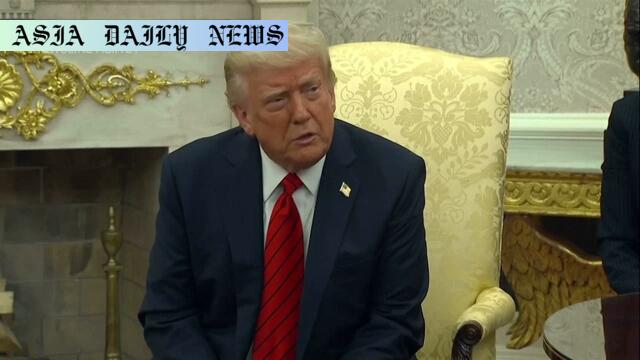Tariffs remain a focal point, with Trump suggesting Nippon Steel-US Steel acquisition might not be included in negotiations.
- Trump suggests Nippon Steel’s acquisition of US Steel may not be part of tariff negotiations.
- Trump signed a new directive for the deal’s review by the Committee on Foreign Investment in the US.
- Past administrative blocks by Biden highlight ongoing concerns about foreign ownership of US Steel.

Introduction: Trump’s Stance on US-Japan Steel Talks
The ongoing tariff negotiations between the United States and Japan have drawn significant attention recently, with President Donald Trump providing his insights into the potential inclusion of Nippon Steel’s acquisition of US Steel within these discussions. On Thursday, addressing reporters in Washington, Trump stated that the acquisition plan by the Japanese steel giant Nippon Steel is unlikely to feature in the ongoing tariff negotiations with Japan, though he left room for this to change under certain conditions. While Trump has maintained that tariff discussions are simpler than incorporating corporate buyouts, the matter illustrates the complicated intersection of foreign investment and trade policy negotiations.
Potential Economic Impact of Nippon Steel’s Buyout
Nippon Steel’s plan to acquire US Steel is not merely a corporate transaction but an event with potential wide-ranging economic and political implications. The acquisition would reshape the international steel landscape, providing Nippon Steel access to advanced technology, massive production capabilities, and a strengthened presence in the North American market. However, past actions, such as the blockage instituted by the Biden administration, demonstrate that US policymakers remain cautious over foreign ownership of critical industries. Revisiting this topic under Trump’s administration has brought fresh hope for proponents of the deal, though the president’s remarks suggest a complicated pathway forward.
Trump’s Actions and Policy Direction on Foreign Acquisitions
Notably, President Trump recently signed an order instructing the Committee on Foreign Investment in the US (CFIUS) to conduct a new review of the Nippon Steel acquisition plan. Trump’s directive underscores the administration’s broader concern over national security risks and economic ramifications linked to foreign acquisitions of American companies. While Trump has claimed an overall willingness to consider the deal, his comments about viewing it separately from tariffs mark a nuanced stance. The president understands the importance of protecting strategic assets like US Steel while fostering an open yet regulated market for foreign investments.
The Broader Context of US-Japan Tariff Discussions
The overall context of tariffs between the United States and Japan forms a critical backdrop to this discussion. Tariffs often serve as both a negotiation tool and a protective measure for domestic industries. For the US, ensuring that foreign acquisitions align with national interests is equally essential. The potential inclusion of Nippon Steel’s buyout in tariff discussions adds complexity, as it risks conflating two distinct economic and political policy areas. Nevertheless, Trump’s statement that “it could be part of it” leaves open possibilities, reflecting the fluid nature of negotiations in dynamic global trade settings.
Conclusion: A Strategic Path Forward
In summary, Trump’s approach to excluding, but potentially including, Nippon Steel’s acquisition of US Steel from tariff negotiations reflects his administration’s balancing act. On one hand, the president aims to simplify economic diplomacy. On the other hand, the need to maintain America’s industrial and national security interests cannot be understated. As negotiations continue, this case illustrates the powerful interplay between trade policy, foreign investment, and broader economic strategies. Policymakers, businesses, and international stakeholders will be monitoring these developments closely, as their implications extend beyond the steel industry into broader US-Japan relations.



Commentary
Trump’s Perspective: A Strategic Balance
President Donald Trump’s remarks on the potential exclusion of Nippon Steel’s acquisition of US Steel from tariff negotiations provide an intriguing look into his economic worldview. At first glance, the decision to separate the acquisition from tariff discussions seems logical. It ensures that the broader economic relationship between the US and Japan does not hinge on a single corporate transaction. Yet, by hinting at its potential inclusion, Trump leaves a door open for recalibration based on evolving circumstances. This deliberate ambiguity speaks to a strategy of maintaining multiple avenues of negotiation in complex trade talks.
Balancing Trade and Sovereignty
The issue of foreign ownership of pivotal domestic industries like US Steel touches on deeper themes of sovereignty and national security. By directing the Committee on Foreign Investment in the US to revisit the deal, Trump appears to strike a balance between fostering international investment and protecting American interests. While some may criticize this approach as indecisive, it reflects the realities of governing in a globalized world, where economic partnerships and national priorities are often interwoven.
What’s Next for US Trade Policy?
Looking ahead, the resolution of this issue has the potential to set a precedent. If Nippon Steel’s proposed buyout ultimately finds approval, under or outside tariff discussions, it could encourage greater foreign investment in critical US industries, provided such investments align with strategic goals. Conversely, a rejection might reinforce skepticism regarding foreign control over essential assets. Ultimately, this case underscores the growing importance of thoughtful, balanced policymaking in an increasingly interconnected global economy. Trade watchers and policymakers alike would benefit from closely following these developments to anticipate how they may shape the future of US-Japan relations.